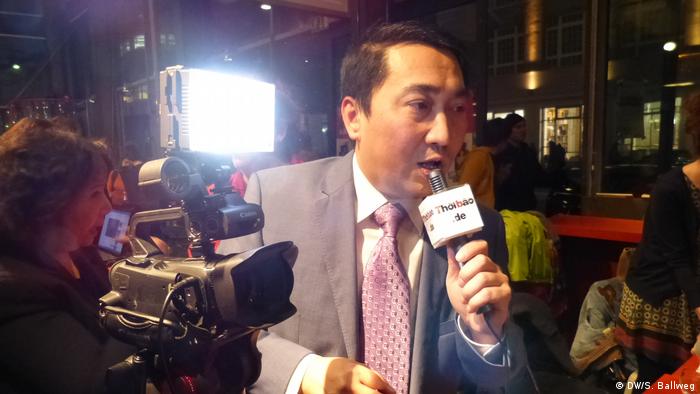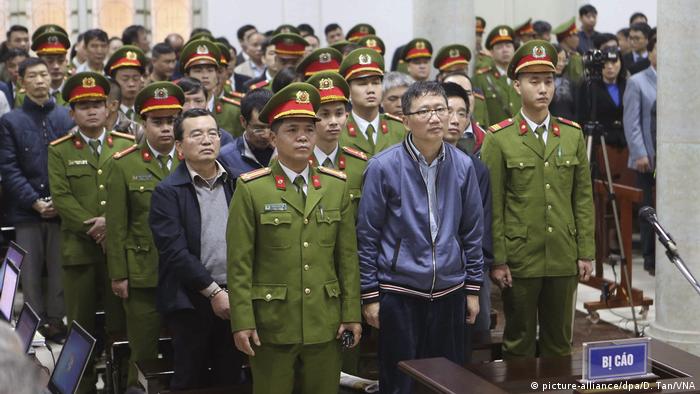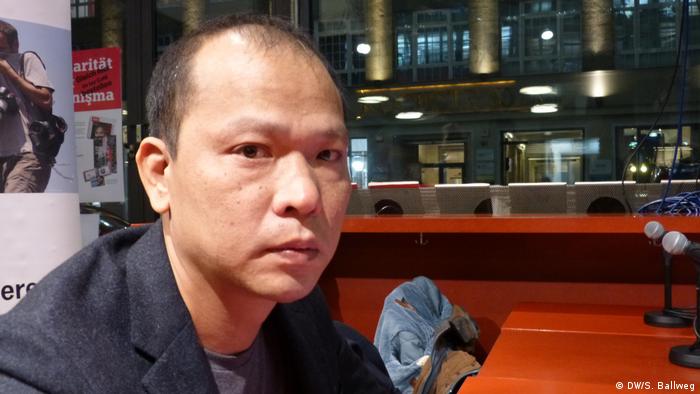“Could I please check your bag?” the security guard at a Berlin cafe asks before inspecting a backpack with a small flashlight.
The precautions are to protect a Vietnamese journalist waiting inside. In a few minutes, Trung Khoa Le will talk about his current situation in Germany. The event was organized by left-leaning daily taz and the NGO Reporters Without Borders (RSF).
“After the invites for the event were sent out, we immediately received threats,” Le says. “Some people posted online that they would show up and throw stink bombs. One person even wrote they would shoot at me.”
 Trung Khoa Le has decided to speak out against Vietnam’s ruling Communist party
Trung Khoa Le has decided to speak out against Vietnam’s ruling Communist party
Fed up with propaganda
Trung Khoa Le came to study in the German city of Weimar in 1993 and stayed in the country after graduating. For the last ten years, he has been running the online news site Thoibao.de, (“Time”) from Berlin.
The website is directed at Le’s compatriots – in Germany as well as in Vietnam. It gets 1.5 million clicks every month. Most stories are in Vietnamese, but some are in German as well.
Initially, Le shone a mostly positive light on the government in Hanoi. He even published stories from Vietnamese state media on Thoibao.de. But the one-sided, euphemistic coverage emanating from his home country increasingly bothered him. In August of last year, an event in his adopted city shocked him so deeply; he could no longer remain silent.
Taken in broad daylight
On July 23, 2017, Vietnamese businessman Trinh Xuan Thanh was allegedly abducted in Berlin. Witnesses saw the 51-year-old being dragged into a car in broad daylight.
Roughly two weeks later, Thanh was paraded on Vietnamese state TV. He said on camera that he returned to his home country out of his own free will.
Le believes Thanh was coerced into making the statement.
“I immediately contacted Thanh’s German lawyer,” Le says. “She gave me details about the kidnapping and I published them on my news site that same day.”
Thanh first appeared in court in early January, accused of embezzling money while working for a state business and of accepting bribes. He faces a life sentence.
By publishing these stories in Vietnamese, Le undermined the ruling Communist Party’s monopoly on information. The consequences were swift to follow. His website was blocked in Vietnam and Vietnam Airlines pulled the ads it had run on Thoibao.de for years.
Ever since, Le has been called a “dog” and “traitor” online and threatened with being shot.
“I believe it’s likely that the people who abducted Trinh Xuan Thanh are still in Berlin,” Le says. “Which is why I still feel very much in danger.”
 Trinh Xuan Thanh has been on trial in Hanoi since January 8
Trinh Xuan Thanh has been on trial in Hanoi since January 8
No press freedom, no freedom of speech
Media outlets in Vietnam are strictly censored. People who openly write about workers’ protests, land grabs or corruption among high-ranking politicians face persecution and prison.
According to Reporters Without Borders, 15 bloggers are currently in jail in Vietnam. On the RSF’s World Press Freedom Index, Vietnam ranks 175th out of 180 countries.
The alleged kidnapping of the businessman Trinh Xuan Thanh suggests that the Vietnamese aren’t just victims of repression in their own country. Life in Berlin feels different for Bui Thanh Hieu as well now. The 46-year-old is among the best-known bloggers in Vietnam and mostly writes about social ills in his home country.
 Vietnamese blogger Bui Thanh Hieu has been imprisoned several times in his home country
Vietnamese blogger Bui Thanh Hieu has been imprisoned several times in his home country
“When my son was born [in Vietnam] in 2005, my wife had some complications,” he says in Berlin. “But hospital staff only wanted to take care of her if I bribed them. That was the moment I started writing about how unfairly regular people are treated.”
Bui was repeatedly jailed over his publications. In 2013, he was finally able to come to Germany thanks to a scholarship from the writers’ association PEN.
Berlin feels less safe
Bui was granted political asylum and lives in Berlin with his family, where he continues to write his blog with the help of informants in Vietnam. He publishes under a pseudonym to roughly 160,000 subscribers to his blog.
Over the last few years, the German capital always seemed like a safe refuge to him. But that has changed after Thanh’s abduction.
“Before the kidnapping last year I wasn’t afraid,” Bui says. “But now I feel like I need to look out.”
Height Insoles: Hi, I do believe this is an excellent site. I stumbledupon …
http://fishinglovers.net: Appreciate you sharing, great post.Thanks Again. Keep writi…
Achilles Pain causes: Every weekend i used to pay a quick visit this site, as i w…






January 18, 2018
Berlin bloggers fear the long arm of Hanoi
by Nhan Quyen • [Human Rights]
DW, January 17, 2018
In 2017, Vietnamese businessman Trinh Xuan Thanh was allegedly abducted in Berlin. Now on trial in Hanoi, his kidnapping has unsettled bloggers and journalists who fled Vietnam for Berlin.
“Could I please check your bag?” the security guard at a Berlin cafe asks before inspecting a backpack with a small flashlight.
The precautions are to protect a Vietnamese journalist waiting inside. In a few minutes, Trung Khoa Le will talk about his current situation in Germany. The event was organized by left-leaning daily taz and the NGO Reporters Without Borders (RSF).
“After the invites for the event were sent out, we immediately received threats,” Le says. “Some people posted online that they would show up and throw stink bombs. One person even wrote they would shoot at me.”
Fed up with propaganda
Trung Khoa Le came to study in the German city of Weimar in 1993 and stayed in the country after graduating. For the last ten years, he has been running the online news site Thoibao.de, (“Time”) from Berlin.
The website is directed at Le’s compatriots – in Germany as well as in Vietnam. It gets 1.5 million clicks every month. Most stories are in Vietnamese, but some are in German as well.
Initially, Le shone a mostly positive light on the government in Hanoi. He even published stories from Vietnamese state media on Thoibao.de. But the one-sided, euphemistic coverage emanating from his home country increasingly bothered him. In August of last year, an event in his adopted city shocked him so deeply; he could no longer remain silent.
Taken in broad daylight
On July 23, 2017, Vietnamese businessman Trinh Xuan Thanh was allegedly abducted in Berlin. Witnesses saw the 51-year-old being dragged into a car in broad daylight.
Roughly two weeks later, Thanh was paraded on Vietnamese state TV. He said on camera that he returned to his home country out of his own free will.
Le believes Thanh was coerced into making the statement.
“I immediately contacted Thanh’s German lawyer,” Le says. “She gave me details about the kidnapping and I published them on my news site that same day.”
Thanh first appeared in court in early January, accused of embezzling money while working for a state business and of accepting bribes. He faces a life sentence.
By publishing these stories in Vietnamese, Le undermined the ruling Communist Party’s monopoly on information. The consequences were swift to follow. His website was blocked in Vietnam and Vietnam Airlines pulled the ads it had run on Thoibao.de for years.
Ever since, Le has been called a “dog” and “traitor” online and threatened with being shot.
“I believe it’s likely that the people who abducted Trinh Xuan Thanh are still in Berlin,” Le says. “Which is why I still feel very much in danger.”
No press freedom, no freedom of speech
Media outlets in Vietnam are strictly censored. People who openly write about workers’ protests, land grabs or corruption among high-ranking politicians face persecution and prison.
According to Reporters Without Borders, 15 bloggers are currently in jail in Vietnam. On the RSF’s World Press Freedom Index, Vietnam ranks 175th out of 180 countries.
The alleged kidnapping of the businessman Trinh Xuan Thanh suggests that the Vietnamese aren’t just victims of repression in their own country. Life in Berlin feels different for Bui Thanh Hieu as well now. The 46-year-old is among the best-known bloggers in Vietnam and mostly writes about social ills in his home country.
“When my son was born [in Vietnam] in 2005, my wife had some complications,” he says in Berlin. “But hospital staff only wanted to take care of her if I bribed them. That was the moment I started writing about how unfairly regular people are treated.”
Bui was repeatedly jailed over his publications. In 2013, he was finally able to come to Germany thanks to a scholarship from the writers’ association PEN.
Berlin feels less safe
Bui was granted political asylum and lives in Berlin with his family, where he continues to write his blog with the help of informants in Vietnam. He publishes under a pseudonym to roughly 160,000 subscribers to his blog.
Over the last few years, the German capital always seemed like a safe refuge to him. But that has changed after Thanh’s abduction.
“Before the kidnapping last year I wasn’t afraid,” Bui says. “But now I feel like I need to look out.”